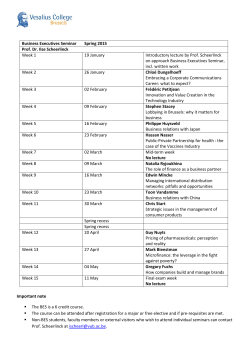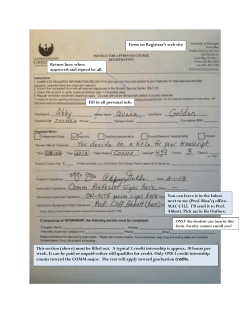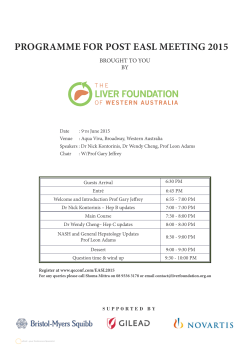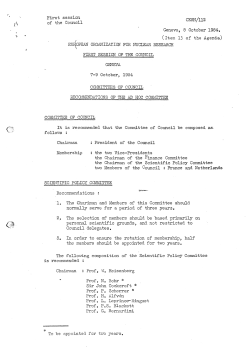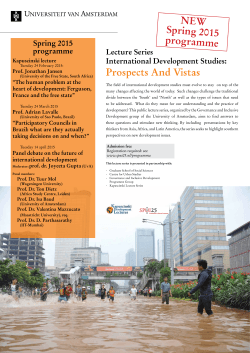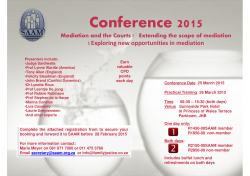
Economics of Transition – 6 ECTS
Course syllabus ECONOMICS OF TRANSITION Main information: Bachelor Course Master Course ECTS: 6 Lecturers by partner institution: Faculty of Economics, University of Ljubljana (prof.dr. Janez Prašnikar, prof.dr. Polona Domadenik, prof.dr. Tjaša Redek) University of Banja Luka (prof.dr. Mladen Ivanić /currently: President of Bosnia and Herzegovina/, prof.dr. Dragan Mikerević). University of Mostar (prof.dr. Hasan Muratović, professor emeritus, School of Economics and Business; University of Sarajevo, Sanela Demirović, M.A. City of Mostar, Secretariat of the Mayor). University of Podgorica (prof. dr. Radoje Žugić /currently: Minister of Finance of the government of Montenegro/, prof.dr. Milan Lakićević ). Aims of the course The course ‘Economics of transition’ focuses on the analysis of the past and present economic performance as well as future development challenges in economies of transition, with the focus on the South-Eastern Europe (SEE). The purpose of the course is to provide the students with a thorough understanding of the path-dependent economic development, where common socialist legacy provided many similarities in the business environment. The path dependency is especially relevant in the SEE region, especially former Yugoslavia, where in addition to common socioeconomic system roots also common historical and cultural elements provide a strong binding feature. The course will equip the students with required understanding of the economic and business environment characteristics in the region. The course will comprise two major parts. The first will be common, providing a summary analysis of the economic development in transition countries. The starting point of this part of the course is the analysis of the socialist period, which defined the common initial conditions for transition. This introductory discussion is followed by the analysis of the transition process itself. Transition was a divergent process because of the differing approaches (gradual vs. shock therapy) as well as (especially SEE region) also lags due to political and nationalistic tensions. Nonetheless, transition economies shared a number of similarities during the high-growth period, just before the crisis. In addition, the EU accession was/is the major polit-economical goal, already successfully fulfilled by the majority of non-FSU countries, with the exception of the majority of former Yugoslav economies. While EU is one of the major economic growth factors and political goals, other factors of future growth and competitiveness in SEE economies will be dealt with: success of structural reforms (especially those concerning the labour market), favourable business environment, FDI and trade. Finally, two pressing groups of issues the transition countries are currently facing will be addressed in a systematic way: (1) financial crisis and (2) future growth sources and challenges, including the role of industrial policy. The second part of the course will focus on the former Yugoslav economies. The purpose of the second part of the course will be to provide country specifics in terms of their past transition development experience as well as current situation and main future challenge overview. Economic development perspective will be linked also to broader with ‘doing business and cultural’ aspects, providing the students with an in-depth understanding of the region and main ‘doing business’ characteristics. Three sub-regions will be carefully analysed: Republic of Srbska, Federacija BiH (both part of Bosnia and Hercegovina, but very culturally different) and Montenegro. In all cases, lectures will provide first a detailed overview of the country-specific economic development at macro level, followed by relevant corporate developments. Country experts will be included to provide the best possible overview. Syllabus* (Lectures held 9:00-11:00) Lecture title Date Lecturer Basic literature Location: Faculty of Economics, University of Ljubljana, Slovenia Manove, M. (1971) A model of Soviet-type economic planning. American Economic Review, 61(3): 390-406. The pre-transition (socialist) period 29.6.2015 Janez Prašnikar Privatization 30.6. 2015 Tjaša Redek Transition and structural reforms 1.7. 2015 The challenges of economic crisis 2.7.2015 Prašnikar, J., Svejnar, J. (1993). Workers' participation in management versus social ownership and government policies: Yugoslav lessons for transforming socialist economies. In: Atkinson, A.: Alternatives to capitalism, London: Macmillan Press: 106-125. Estrin, S., Hanousek, J., Kočenda, E., Svejnar, J. (2009). The Effects of Privatization and Ownership in Transition Economies. Journal of Economic Literature, 47:3, 1–30. EBRD Report, 2009, 2014. Tjaša Redek Janez Prašnikar Bole, V., Oblak, A., Prašnikar, J., Trobec, D. 2014. Financial frictions and indebtedness of firms: Balkan countries vs. Mediterranean and Central European countries. Presented at the IEA World Congress, Dead Sea, Jordan, 6. Junij 2014. Slovenia 3.7.2015 Polona Domadenik Domadenik, P. & Prašnikar, J. & Svejnar, J., 2014. "Legal Corruption, Politically Connected Corporate Governance and Firm Performance," IZA Discussion Papers 8321, Institute for the Study of Labor (IZA) (in the process of review in the Journal of Business Ethics). Transfer to BiH (Banja Luka) Country analysis: BIH (Republic of Srpska) 6.7. 2015 Mladen Ivanić Micro analysis 7.7. 2015 Janez Prašnikar, Dragan Mikerević Country analysis: BIH (Federacija BIH) 9.7. 2015 Hasan Muratović Micro – Mostar 10.7.2015 Sanela Demirović 13.7. 2015 Radoje Žugić Prašnikar, J., Mikerević, D., Voje, D. (2014). Blockholding and organisational diversity : the case of transition economy. Journal for East European Management Studies, 19(3): 277-304 Transfer to Mostar Transfer to Kotor Country analysis: Macro Montenegro Janez Prašnikar, Milan Lakićević Country analysis: Micro Montenegro Koman, M., Lakicevic, M., Prašnikar, J. & Svejnar, J. (2015). Asset stripping and firm survival in mass privatization: testing the hoff-stiglitz and campos-giovannoni models in montenegro. Journal of Comparative Economics (in print). 14.7.2015 Tjaša Redek Preparation for exam 15.7.2015 Exam 16.7.2015 Oblak, A., Redek, T., Dumančić I., Stanić, M. Vujačić, N. (2014). Industrial policy in Croatia, Montenegro and Serbia. In, Prašnikar. J. (ed.): Industrial policy in Retrospective. Ljubljana: Finance, d.o.o. (2014): 85-109. Bibliography A selection of articles and book chapters. The basic literature by topics is provided. Additional papers or data sources may be used. Any additional material will be provided in class. Teaching methods The course will use a combination of standard lectures, in-class work (case studies), and field trips (company visits). Prerequisites The students are expected to be familiar with introductory levels of macroeconomics and microeconomics. Examination methods The students will be expected to: 1. be actively involved in class work 2. prepare and present a seminar paper 3. take and pass the written exam
© Copyright 2025

